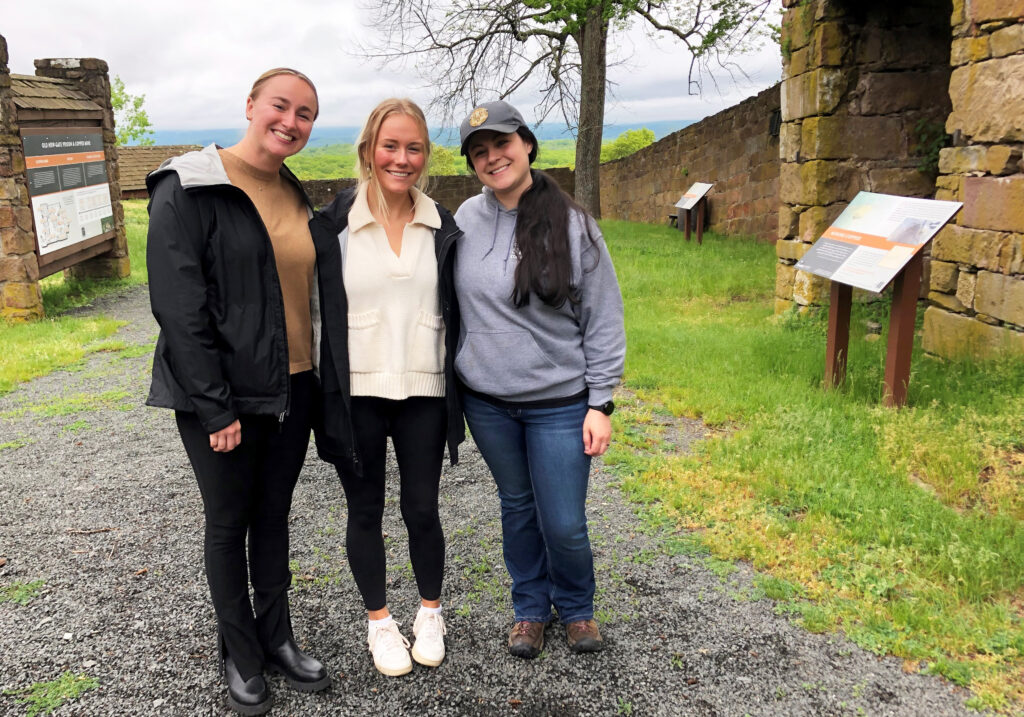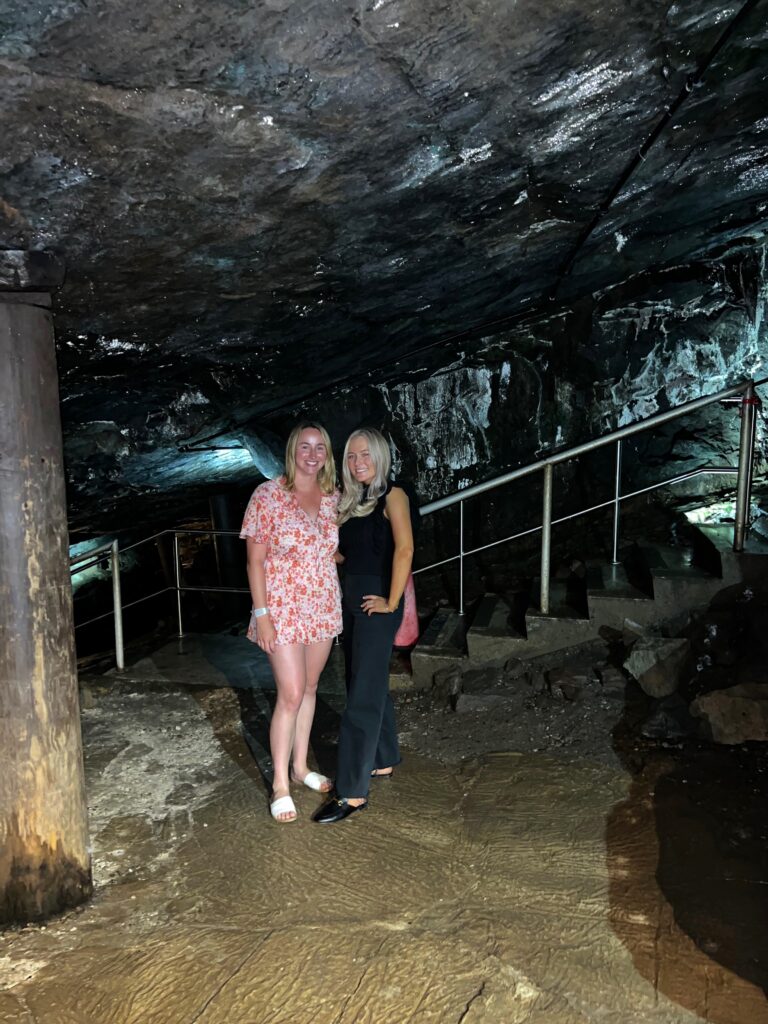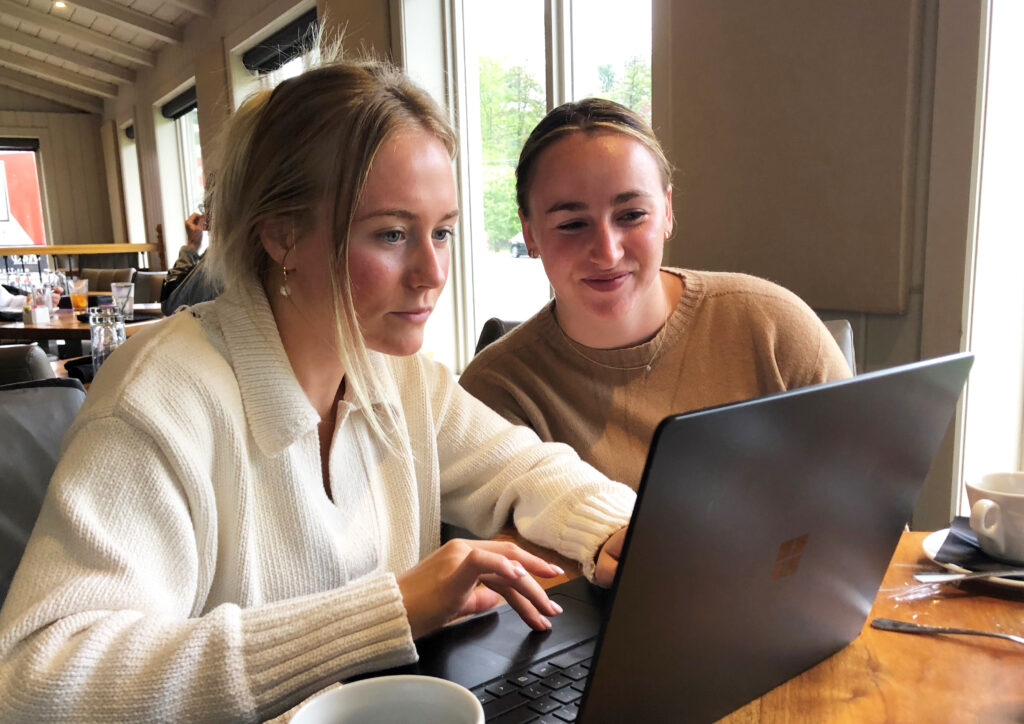Summer Research Project Has Students ‘Humanizing History’ at Old New-Gate Prison
A Public Humanities Collaborative research project this summer turned two Trinity College students into detectives of history, as they worked to tell the stories of inmates at the country’s first state prison and to investigate the roots of mass incarceration. The PHC is a summer research opportunity that brings together students, faculty, and individuals and organizations in Hartford.

For the project, “Humanizing History at Old New-Gate Prison,” Zoë Gill ’23 and Madison Wilson ’23 spent 10 weeks focused on the long and complicated past of the American prison system. Old New-Gate Prison & Copper Mine—located in East Granby, Connecticut, just 30 minutes from Trinity—is nationally recognized as the first chartered copper mine and first state prison in early America. Today it operates as a state-run museum.
Working with Museum Curator and Site Administrator Morgan Bengel, the students began by documenting the individuals incarcerated at New-Gate, an abandoned copper mine that became a prison in 1773.
Gill, a public policy and law major and formal organizations minor from Newtown Square, Pennsylvania, said, “We started with a prisoners list that was missing a substantial amount of information. Our goal was to organize the list, making it condensed but as complete as possible, looking at race and ages of the prisoners, and their crimes and sentences. We searched through archives at the Connecticut State Library, at the prison, and through various digital databases.” Gill noted that the most common crimes documented at the prison, which ceased operation in 1827, included horse-stealing, burglary, and counterfeiting.
Wilson, a double-major in art history and public policy and law from Denver, Colorado, said, “We got help from [digital scholarship coordinator] Mary Mahoney and [research, technology, and outreach librarian] Cait Kennedy in Trinity’s Library & Information Technology Services to turn the information that we had into an interactive web platform for visitors to the museum to explore. It offers a deeper dive into history and the stories of the prisoners.” Museum guests will be able to scan QR codes to link to the website.

The students said that this project has given them both new skills and new perspective. “We’ve gained insight into the lives of individuals whose lives often go unnoticed,” Gill said. “We’ve also learned how to build a website that we hope will continue with future PHC students or volunteers at Old New-Gate. This project is something that will continue to evolve and grow.”
Wilson added, “Visiting the first state prison in America, and seeing where people were locked in a copper mine, you can feel how inhumane that is. You recognize the progress that the country has made in terms of prison systems, but also how similar prisons are today in some ways.”
The data and stories that Gill and Wilson compiled about the prisoners is important historical research that sheds light on what they experienced, Bengel said. “Their work will be available for our visitors and audience, to learn more about New-Gate’s history,” she said. “We have a limited amount of time with each visitor, so giving them an opportunity to explore more online and have the information approved by us is very valuable.”
Bengel added that this project benefits the students as much as it does the museum. “On-site research adds to the students’ educational experiences because they are able to apply their research and directly benefit the public,” she said. “They can know that their work will outlast them and benefit the museum as well as our visitors. I hope that gives them a sense of accomplishment and responsibility for their research and skills they learn at Trinity.”
As another component of the summer project, Gill and Wilson worked with Professor of the Practice in Public Policy and Law Glenn W. Falk to study American prison history and the roots of mass incarceration.

Wilson said, “We are assisting with research about the Van Wormer brothers, three young men imprisoned and executed in Dannemora, New York, in 1903, and Anthony Spitzka, a scientist who believed the death penalty should change from hangings to the electric chair.”
For Falk, research at New-Gate represents the intersection of his interests in law and history. “I used to be a special public defender, so I’ve spent a lot of time in prisons,” he said. “With this project, I’m seeking the origins of the various problems of mass-incarceration and racism and the overly punitive nature of our system. The Public Humanities Collaborative allows me to extend my teaching and give students some familiarity with this type of work, and it also helps this local institution.”
This is the second summer in which Falk has worked with Trinity students at New-Gate on this PHC project. “Part of a liberal arts education is to understand the law as a part of a whole range of human endeavors,” he said. “This project unites present and past, and it gives insight into questions of public policy and law that we’re still dealing with today. Being able to visit the actual prison, you appreciate more what the actual experience of being incarcerated is like. It helps reinforce legal history when you can go beyond reading a court decision in a classroom. I think it inspires some people to pursue careers in the criminal justice system or the legal profession when you can be directly involved in this way with documents and with the physical site. It adds to the intellectual experience immeasurably.”
To continue her work from the summer, Gill plans to write a senior thesis, supervised by Falk, focusing on the evolution of capital punishment. Gill has interned previously with the Innocence Project and hopes to attend law school after Trinity. “This summer has clarified that criminal justice is a path I’m interested in,” she said.
Wilson plans to pursue an independent study to continue this project in the spring. Wilson said, “This gave me a chance to combine my two interests by working in a museum and in the legal system. A career in museum law is something I could see myself going into.”
